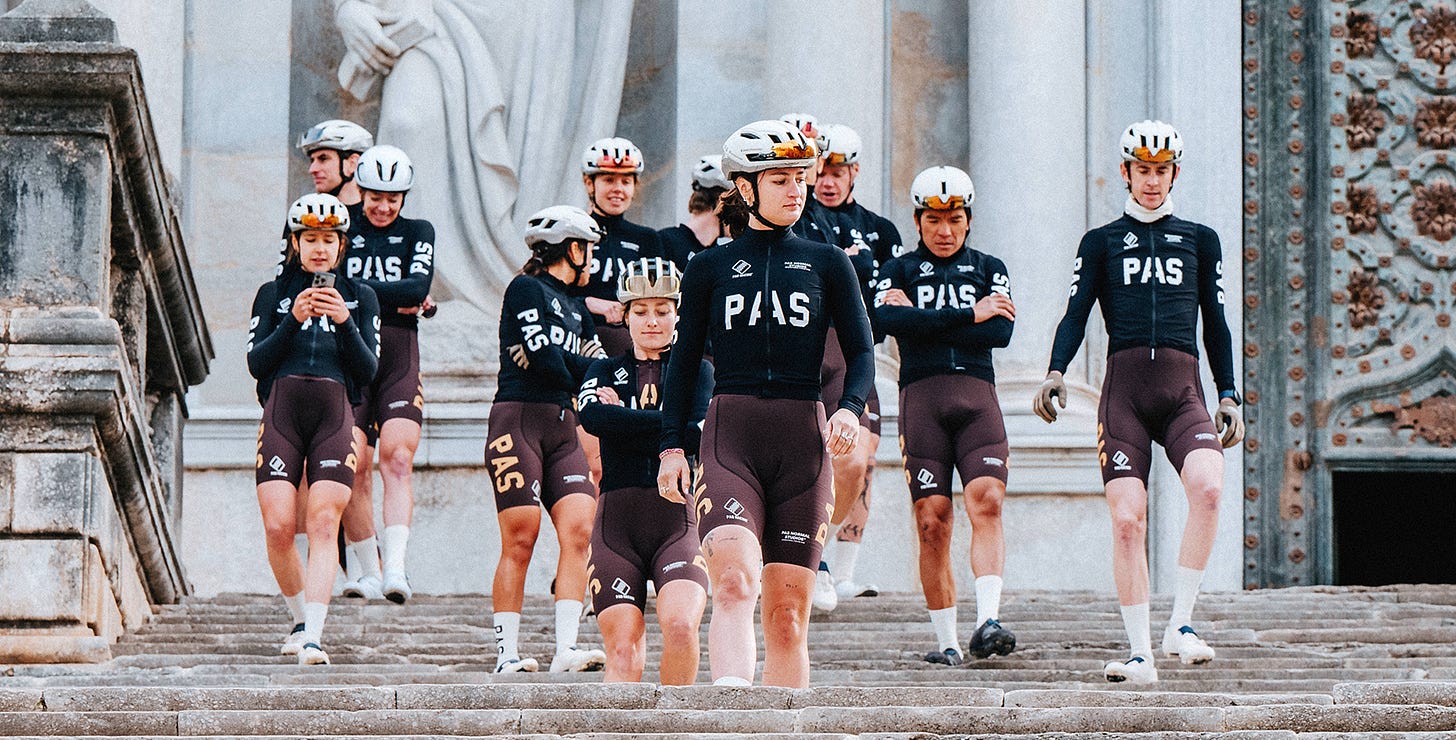Gravel racing's future: Progress or politics as usual?
New teams are forming, and old politics are creeping in.
Gravel is in flux right now. Teams are coming in, money’s flying around, and calendars are clashing. Depending on who you ask, the bubble is about to burst or the wave is still building.
Here are some rumours, and me trying to make sense of it all.
Teams are coming, but what does that mean?
It’s an open secret that Specialized are bringing a team to the table, and there’s an extremely strong rumour that Canyon will too. The make-up and transfers of those teams will cause shock waves, but I’m no Daniel Benson, so I won’t be writing who.
If we add in the Classified, Ridley, Ribble, and PAS teams, we have something meaningful. Whether we’ll start to see team tactics at Unbound is certainly something that’ll be worth following. If these end up being teams in the traditional sense, then it’ll be a big change, but we’re in a weird privateer-team hybrid middle ground. Take PAS Racing, they’re a team, but they all have different bike sponsors, so they’re not necessarily incentivised to race with their team mates.

What will the collapsing pro-road job market mean?
If the rumours are to be believed, within the next 18 months Lotto and Intermarche will merge, and Total Energies, Arkea, Wagner Bazin, and Team Flanders-Baloise will fold. That’s an awful lot of talented riders on the market, and there’s an inevitability that some will find their way onto the gravel scene.
So far, the front-runners in gravel have largely come from mountain biking. That’s no surprise; it’s a numbers game. Pro road racing offers more paid spots, and the hundredth-best roadie in the world can still clear $250k in salary. For context, that’s roughly what a top-five World Cup mountain biker will make, with Nino Schurter as the obvious outlier. MTB contracts are fewer and far less lucrative, so it’s easy to see why so many have viewed gravel as a viable path.
But, with road jobs drying up, or more accurately, there being an oversupply of talent in the market, the gravel dynamic could begin to shift. We’ve already seen riders like Mads Würtz Schmidt and Simon Pellaud show what happens when a WorldTour-level engine is dropped into gravel.
The question is whether more will follow, and if they do, how it will reshape gravel’s identity. A wave of road pros could push the scene toward a more professional, ruthlessly competitive model. That could mean harder racing, higher speeds, and new tactics. But it could also threaten the “privateer dream”, the idea that anyone with hustle, creativity, and a decent engine can make a career in gravel.
The calendar needs a sort out.
Hot take: Neither Life Time, Gravel Earth, nor the UCI have a good race series.
The Life Time Grand Prix is good, but it’s not gravel; it’s a multi-discipline series. Plus, the storytelling is a bit shit. Why are four of the six races after August?
The pros to Life Time are obvious: prize money, worldwide coverage, and the biggest races. Unbound and Leadville are the jewels in the crown, events that transcend the series. Sea Otter holds its own, but Chequamegon, despite being the USA’s oldest MTB race, lacks relevance. Little Sugar and Big Sugar are fine, but they don’t yet have the pedigree that makes the crown jewels feel special. It’s a bit like ASO on the road: Unbound is the Tour de France, Leadville is Paris–Roubaix, and the rest, while important in their own right, will always live in the shadows.
The Gravel Earth Series has some big races. However, the scoring system is so complex that it hurts my brain, and there are way too many races. With a bloated calendar, it also lacks identity or a hook for a global audience to care about. Less would be more here.
And, the UCI…golly, where do I start with the UCI? Dangerous races, mixed gender starts, the list really goes on. They have the basis of something good, but it needs much better organisation to garner any respect at all from the racers.
US vs the Rest of the World
Gravel in Europe is growing rapidly. There are countless races and the standard at the front of those races is insanely high. However, bar Traka, the US still holds all the legitimacy in gravel.
I understand why. Gravel has its roots in the US, there’s more prize money, more sponsorship money, and ultimately more fans too. Gravel doesn’t have to compete with the pro-road scene in the US either.
However, it’s quite difficult for Europeans to go and make their mark on the US gravel scene. There are a few reasons - mainly logistical and financial. There’s no doubt in my mind that Keegan Swenson is head-and-shoulders above everyone else in world gravel, but apart from him, I think the gap between the respective scenes’ talent is negligible.
I don’t have a bias either way. All I know is that the Americans deem the Euros to be unprepared for US Gravel, and the top Americans haven’t really come over to Europe to show what they're made of yet, because, well, there’s no need to.
I think the continental competition is healthy for the sport, and I’m looking forward to seeing Keegan Swenson win the Traka one day soon.
Can gravel continue to monetise?
Money makes the world go round, and although it’s such a taboo subject for so many, we need to talk about it. I want there to be more openness with gravel salaries. Why? Because it’s better for everyone. Brands should know the cost, and athletes to know how much others are being paid.
The problem with gravel is that there’s no solid X=Y calculation to salary like there is on the road, or MTB. There are SO many gravel races, and barring a core few of them, it’s hard to say that winning race X equals salary Y.
Then there’s the content side too. Some get paid more as their personal profile is bigger than their results, which is completely fine; business is business. Some brands come in and pay massively over the odds; there are some that don’t have a clue.
Riders can make a good living off gravel, but don’t think every single one of us who races gravel is rolling in it - trust me. The gravel scene largely like MTB, seems to be funded by the cycling industry, unlike the road, where it’s more non-endemic. It’s also quite clear that US riders make a lot more money than those in Europe.
Doping?
There is zero reason, rumour, or conjecture for me to write this; let me be clear. I have never seen or heard of anything in my career.
Why do I bring this up at all then? Well, living in a house with three World Tour roadies, it’s pretty normal for our doorbell to go off at seven in the morning with an anti-doping officer. To the best of my knowledge, there are just a few guys in the gravel peloton on Whereabouts.
I suppose this is more of a careful warning. If the sport of gravel continues to grow in prize pots and salaries, then we have to invest in anti-doping too. Look at triathlon for some case studies…
What annoys me most with gravel is that there are all the ingredients to make something special, but there are, just like road racing, too many stakeholders. On the road, it is the ASO that holds all of the power because they own the Tour de France - then there’s RCS, Flanders Classics, the UCI and the teams. The list goes on.
Gravel has gone the same way. This past weekend, there was Sea Otter UCI in Girona, the same weekend as the European Gravel Championships. UCI Gravel Worlds clashes with the penultimate round of the LifeTime Grand Prix.
It’s frustrating. And for all those of you who read this and say racing spoiled gravel or whatever. I both agree and disagree with you. There is now professional gravel racing, and that is good as it brings more riders, more attention, and more investment into the sport. If you don’t like it, you don’t have to care. The beauty of gravel is that you can still ride your local event, line up next to pros, and have the same experience on the same roads.
The bigger question is: will gravel learn from the mistakes of the road, or repeat them? Right now, it feels like we’re heading for the same turf wars, calendar clashes, and fractured storylines. Gravel racing doesn’t need a Tour de France, but it does need some coordination, otherwise it risks cannibalising itself before it truly gets going.
The paid subscription and ‘Buy Me A Coffee’ link allow me to continue writing these posts. Thank you all for your contributions; they’re always appreciated.
https://www.buymeacoffee.com/joelaverick
The following brands are racing partners of mine which allow me to do cool stuff.




Great article, my take on it:
It is a mistake for gravel to look at the world tour or mountain biking as some sort of north star.
Gravel is cycling's ironman. What is unique about it (as you alluded to at the end of the article) is that thousands of age-groupers, from first timers through to competitive athletes, can take part on the same course at the same time as the elites.
That completely changes the opportunities to develop a sustainable standalone financed sport. Like in triathlon, the sponsorship opportunities arise not just for the elites but even the age-groupers that can build a good following and demonstrate value for brands. There is direct finance entering the sport through race entries, there is a captive audience of actual participants.
If you are canyon, would you rather have a cycling fan see your promotional piece (that may be an armchair fan with no intention of ever riding a bike) or an age-group athlete that will definitely spend money on a new bike at some point and may even market it for free on social media for you?
That's exactly how ironman has become such a behemoth in the sport - not by broad appeal TV audiences watching the elites, but by exploiting (deliberate word usage as ironman have gone a bit too far) age groupers.
This also ties in nicely to the team development idea. Can you create a sustainable pro team and justify to sponsors you are offering them genuine value every year? It would be pretty tough.
Can you create a community pyramid with an elite team at the top and tens/hundreds of age-group athletes underneath that by nature of their participation, are a captive audience lapping up kit and merch and supporting partner brands? That would be a lot more attractive to me as a potential sponsor.
Great post Joe. I spent years in the running event business. And when I did my first gravel race (BWR) in 2017, I immediately recognized the marathon business model: Olympians at the front and age groupers of all levels behind them. Agree that the calendar is a mess, and I still think safety is not taken seriously by many (most?) gravel races. Keep sharing your smart insights.